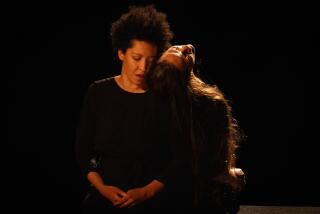MUSIC REVIEW : Effortless Artistry Displayed by Soprano Von Stade
- Share via
SAN DIEGO — Those who lament the demise of the vocal recital may have statistics on their side. But the best argument for the viability of this purportedly waning art form is mezzo-soprano Frederica von Stade. Her Saturday night recital at Civic Theatre was a paradigm of effortless artistry that balanced sophisticated interpretation with unmistakable personal warmth.
Von Stade opened with a pair of arias from one of her calling-card operatic roles, Cherubino from Mozart’s “The Marriage of Figaro.” If her “Voi che sapete” was all coy composure, she unleashed a bit of welcome drama in “Non so piu cosa son.” The focus and clarity of her supple voice makes her a Mozart singer of uncommon elegance, a trait which she mirrored in her impeccable stage demeanor.
A set of three early Strauss songs and five familiar Schubert lieder brought out appropriate emotional and vocal contrasts. Although Von Stade does not have the creamy warmth of a true spinto , she floated Strauss’s long lines, especially in “Rote Rosen,” with admirable grace and a sympathetic nod to the composer’s ripe Romanticism.
In her Schubert lieder, she revealed her serious side, bringing her listeners closer to the music rather than retreating into these vocal miniatures. She made the 3,000-seat hall seem oddly intimate, especially with her gently shimmering “Wiegenlied” and dreamy “Nachstuck.” The ever fluent Martin Katz cleanly sculpted the keyboard accompaniments to intensify her vocal concentration.
Lest she deprive her audience of her bel canto calisthenics, Von Stade included the final aria of Rossini’s “La Cenerentola.” Although she traversed most of the aria’s demanding fioritura with uncanny finesse, some of her top notes did not come out unscathed, although it was the only time all evening her highest register failed her.
Five songs by five different 20th-Century American composers were a welcome tonic to Rossini’s artifice. Notable in this set were Virgil Thomson’s “St. Catherine of Sienna,” in which Von Stade revelled in the composer’s irreverent piety, and Copland’s thoughtful “Why Do They Shut Me Out of Heaven?” If only Von Stade had not made the philosophical questions in Emily Dickinson’s poem conversational rather than rhetorical. Ives’ “Serenity” and Rorem’s “I am Rose” were models of worthy understatement, and Richard Hundley’s “Come Ready and See Me” proved to be a sweetly forgetable bauble.
It is difficult to feel unmitigated enthusiasm for a first rate interpretation of third rate music, which sadly is the most charitable thing that can be said about Joseph Canteloube’s four “Chants de France” that concluded the program. That Von Stade lavished her vocal gifts--and Katz his digital dexterity--over these cloying, over-written folk songs is both a tribute to their discipline and an indictment of otherwise tasteful programming.
More to Read
The biggest entertainment stories
Get our big stories about Hollywood, film, television, music, arts, culture and more right in your inbox as soon as they publish.
You may occasionally receive promotional content from the Los Angeles Times.










